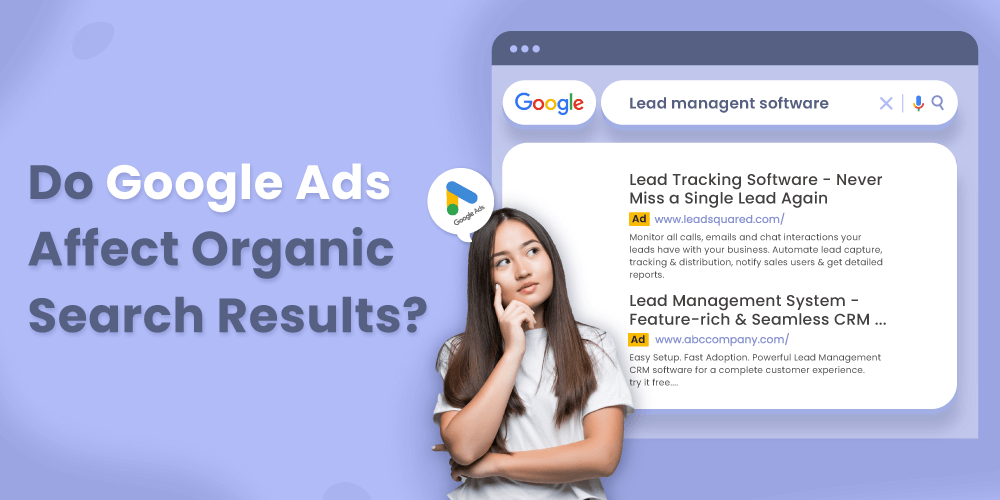eCommerce marketing automation is an opportunity to speed up, simplify, and improve your sales and marketing tasks. In particular, mailing and communication with users in an ecommerce business can benefit greatly from ecommerce marketing automation strategies. 51% of companies are already using marketing automation of some sort. But when it comes to e-commerce business, a thoughtful approach can drive better benefits.
Here are five ways in which marketing automation can improve lead conversion rates in the e-commerce business. If you want to implement it but don’t know where to start, this article will help you out.
So, let’s get started!
What is eCommerce Marketing Automation?
eCommerce marketing automation refers to the use of software and technology to automate repetitive marketing tasks, streamline workflows, and personalize customer experiences across multiple channels. For eCommerce businesses, this means leveraging customer data and behavior to create targeted and effective marketing campaigns that drive conversions, revenue, and customer loyalty.
By automating tasks such as email marketing, social media posting, and customer segmentation, businesses can save valuable time and resources. This allows them to focus on high-value activities like strategy development and customer relationship building. In essence, marketing automation helps eCommerce businesses operate more efficiently and effectively, ensuring that every customer interaction is meaningful and personalized.
Chatbots on Social Networks
Social media marketing is vital for sales. According to a 2019 survey, 30% of consumers plan to shop directly from social media platforms. Therefore, improving the customer experience on social media is essential.
Chatbots will help with this. They are software that simulate human-like communication to answer user questions. It is advisable to customize them so that they provide relevant information to users. For instance, methods/terms of delivery, payment terms, promotions/discounts, return/refund request, etc.
Chatbots can be integrated with various ecommerce platforms to enhance customer interaction and streamline communication.
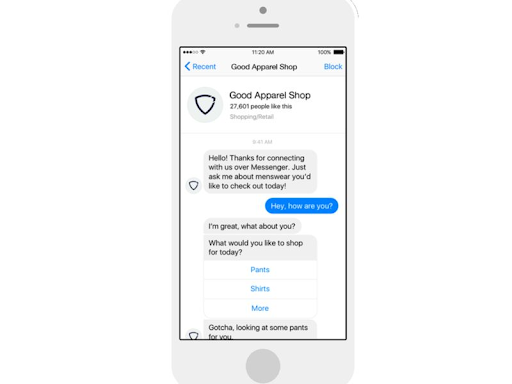
Even if 20 users simultaneously write to the company, the program will instantly give them a response. It allows the brand to be close to customers – always.
Also, the software allows you to reduce the cost of customer service. They eliminate the need for support staff for common queries.
Let us take an example.
Facebook Messenger has a chatbot. It is available for use since 2016. It has evolved so much so that today you can set up a full-fledged conversation flow, providing possible questions and corresponding answers to customers directly on Facebook itself.
The idea is – you can use live chat or chatbot services from companies such as ManyChat, ChatBot, and many others to automate customer communications from your social channels.
Loyal Customer Rewards
Loyal customers are the strength of the brand. Based on prior experience, they are probably more inclined to buy from your company. Research shows that loyal customers spend 67% more money than new customers. Therefore, building relationships with users is essential. It also ensures the company’s growth in the long term.
In e-commerce, building customer relationships is more challenging than offline buying. While there can be live interactions, the lack of face-to-face interactions makes it tricky to gain customer trust. Also because of constant ad bombardments from several companies, it becomes difficult for customers to remember a brand.
You can stand out from the competition by personalizing your communication. For instance, you can propose a special offer based on items that a person regularly buys. It is usually appealing to regular customers.
If you see, Dunkin Donuts has perfectly embodied this idea. The company has launched a loyalty reward program. Here, users earn points by using their enrolled DD Card to pay for qualifying purchases at restaurants. Also, as part of this campaign, users received exclusive targeted offers based on their order history.
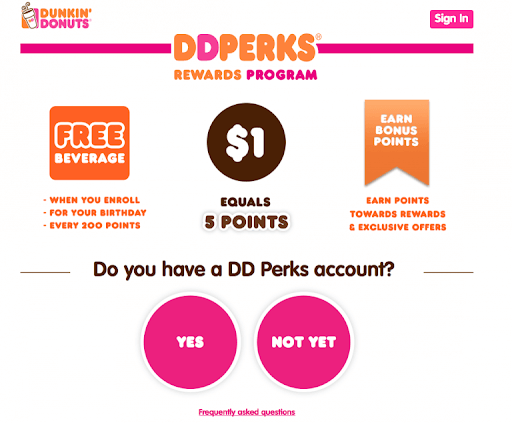
An ecommerce marketing automation platform can help manage and optimize loyalty programs by automating customer segmentation and targeted offers.
Rewarding regular customers is especially beneficial in the pre-holiday period. Marketing automation software will help you identify loyal customers and opportunities to upsell/cross. All you need to do is to integrate the eCommerce Marketing Automation tool into your company’s e-commerce application. The software will start collecting the customer data by itself (after the consent of the buyer, of course). Based on interaction history and past purchase data, you can identify customers for the loyalty program.
Moreover, you don’t have to send invitations manually. The email automation tool will do this for you. All you need is to specify recipients (in most cases, marketing automation does it by itself) and draft email content.
Triggered Automated Email Campaigns
The ability to react quickly to what is happening provides an opportunity to influence the situation through automated email campaigns. It is applicable in the e-commerce business as well.
The most common scenario is – users register themselves on a website, explore products, and leave the site without making any purchases. There can be several distractions in between that lead to customers not making a purchase. The result is – you have lost a customer who is highly interested in the product.
But, if you have a drip marketing solution in place, you can overcome this challenge. It will allow you to react to such instances instantly. In particular, through triggers. Triggers represent an action, or a condition, upon reaching which an automatic distribution/call/offer is activated. Triggers are the basis of this whole process. But you must define them yourself. The following are some criteria (based on the “If-then” logic) for triggers.
- If a person has bought bright socks with a print, you can offer him a new collection with drawings.
- If the buyer has abandoned the cart (did not complete the purchase), send a reminder email to the user within a week.
- When the user registers on the website, the program sends a welcome letter, and so on.
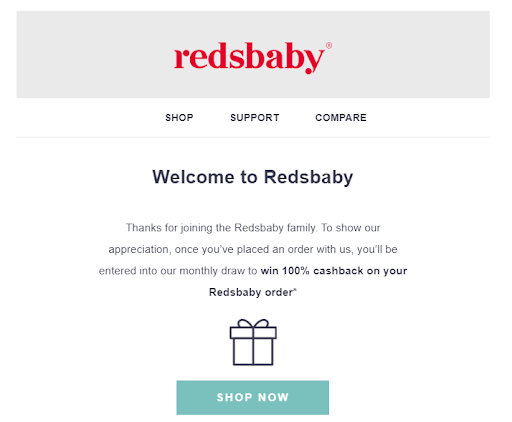
Automating email distribution through triggers allows for a better match to users’ interests. It also makes the messages as timely as possible. You can send trigger automation emails in response to:
- Newsletter subscriptions
- Making a purchase
- Feedback shared
- Early booking of special offers
- Frequent visits to the page, indicating a high willingness to purchase.
- Run a sophisticated email setup with a powerful, affordable, easy-to-use marketing automation platform.
Assessing Potential Customers With Customer Data
Ecommerce companies use a variety of tools to drive traffic to their website. These include SEO, contextual advertising, affiliate marketing, and more. However, traffic does not guarantee sales.
Sometimes a prospective buyer who visits the site will be interested in the product but hasn’t decided to buy yet. The visitor may return to the site and still not place an order. In such instances, you need to nudge them a bit to buy.
eCommerce marketing automation tools help with this. For example, you can track their interactions on your website and use it to assess the user’s readiness to buy. You can also assign scores to specific web pages. For instance, if the person visits the pricing page, you can assess that he has a buying intent. So, set more scores for such pages. Other useful actions are clicking on an email CTA or adding products to the cart. You can also set a peak score (for example, 25). When the user reaches this value, the system can automatically send a task alert to the sales department to close the deal.
Do not assign a rating to every action. Some of those may not indicate the potential of conversion. Also, consider the weight of the individual steps. A visit to the homepage is okay. However, viewing the pricing details is a better indication of readiness to purchase. Therefore, the scores for actions should be consistent with their significance.
When evaluating leads, consider:
- The number of times the buyer has visited your site
- What pages the user has visited
- Duration of the session on the site
- Email Opens
- Email link clicks
- Blog articles read by the user
- Downloads
- Activity on social networks.
Implementing effective e-commerce marketing automation strategies can help in accurately assessing potential customers and improving conversion rates. This process of lead qualification can save your marketing and sales teams valuable time by avoiding wasting resources on low-quality leads.
Website Personalization
Marketing automation tools allow you to make personalized offers at every stage of the interaction, even if this is their first visit to the site.
The services track and analyze user data. For example, the location, products/services browsed, etc. Based on this information, the tools can customize and personalize the messaging that appears on the site.
Using ecommerce marketing automation software, businesses can track and analyze user data to deliver personalized experiences.
A simple example is the Adidas website. On the first visit, the user is asked to confirm their location/give location access. Next, it displays the version of the site in the language based on the location along with the updated currency.
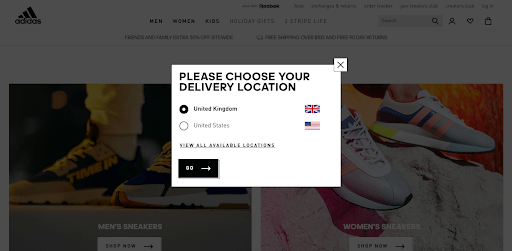
However, be thoughtful while implementing this idea. If you are about to create a website or want a new look for your site, you can check out these inspirational website ideas.
Lead Capturing and Nurturing
Lead scoring and nurturing in e-commerce automation are strategic for better conversion rates through the valuation of prospects and their involvement. Scoring gives points to a lead for various activities, including browsing history, buying habits, and even opening an email, according to their behavior and frequency of engagement with your online store. This is a scoring system that can help you quantify the possible value of each lead and define which prospects are likely to become paying customers. You’re in a position to be able to optimize your marketing efforts and resource allocation more effectively because this enables you to put extra focus on these high-value leads to ensure proper targeting and effectiveness of strategies.
Lead nurturing will help build relationships and take prospects deeper into the sales funnel by sending them branded, personalized communications and customized promotions. Automate follow-ups, relevant content, and special promotions to specific interests and needs. This will keep your brand top of mind and improve the chances of converting. The effect is that this structured approach enhances overall customer experience, increases loyalty over the long term, and maximizes the lifetime value of each customer. Utilize lead scoring and nurturing to create an active, responsive e-commerce strategy that nurtures engagement for growth and success.
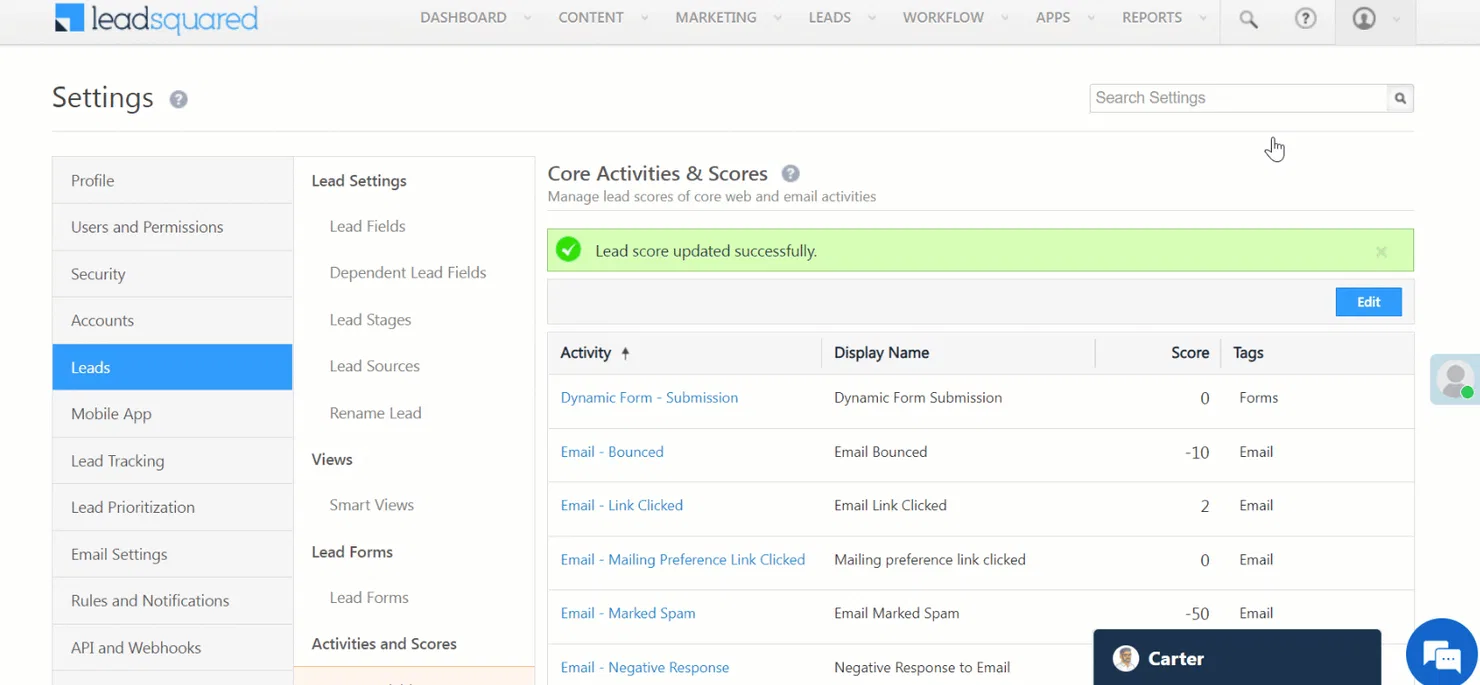
Use of Data
E-commerce automation offers very personalized content, targeted promotions, and timely follow-ups, all based on the collected data through automated email, SMS, or push notifications. Analysis of customer behavior, preference, and interaction allows the business to craft tailored messages and offers related to individual needs and interests. This level of personalization will enhance customer experience, ensuring that the communication is relevant and engaging, therefore increasing the likelihood of capturing customer attention.
Moreover, personal touches in lead nurturing translate to increased movement through the sales funnel. Relevant information and special offers can raise conversion chances if it is timely with e-commerce automation. This also allows for customer loyalty long-term through continued meeting and exceeding expectations, thus building a better relationship between the customer and the brand.
Cross-Channel Marketing Automation
Cross-channel marketing automation involves automating marketing efforts across multiple channels, including email, SMS, social media, and on-site marketing. This approach enables businesses to create a seamless and consistent customer experience across all touchpoints, increasing the chances of conversion and customer loyalty. By integrating multiple channels, businesses can:
- Reach Customers Where They Are Most Active: Engage with customers on their preferred platforms, whether it’s email, social media, or SMS.
- Create a Unified Brand Voice and Message: Ensure that your brand’s messaging is consistent across all channels, reinforcing your brand identity.
- Enhance Customer Engagement and Retention: Provide a cohesive and personalized experience that keeps customers coming back.
- Drive More Conversions and Revenue: By delivering the right message at the right time, you can increase the likelihood of conversions and boost your bottom line.

Choosing the Right eCommerce Marketing Automation Software
Selecting the right eCommerce marketing automation software is crucial for businesses to achieve their marketing goals. When choosing a software, consider the following factors:
- Ease of Use: Look for a user-friendly interface that is easy to navigate and set up, ensuring that your team can quickly adapt to the new system.
- Integrations: Ensure the software integrates with your existing eCommerce platform, CRM, and other marketing tools to create a seamless workflow.
- Customer Support: Choose software with reliable and responsive customer support to assist you in case of any issues or questions.
- Price: Consider the cost of the software and ensure it fits within your budget while providing the necessary features and functionality.
- Features and Functionality: Evaluate the software’s features and ensure they meet your marketing needs, such as email automation, customer segmentation, and analytics.
5 Ecommerce Automation Software to Explore This Year
Right marketing automation software simplifies and speeds up online retail by automating tasks and optimizing processes. This software brings together all aspects of e-commerce; marketing, sales, inventory management, and customer service into one system. If you’re looking for one, here are five ecommerce automation software that you can explore this year!
LeadSquared
LeadSquared is a robust platform that has lead management, email marketing and sales automation tools. It can help your business streamline processes and increase your lead-to-customer conversion rate. This is super useful for e-commerce!
It is a versatile tool that can fit into any business needs, making it a great asset for e-commerce businesses looking to automate.
Here’s what it offers to businesses of all sizes:
- Lead Management: Capture, track, and manage leads from multiple sources in a simplified manner.
- Marketing Automation: Automate email, SMS, and other campaigns easily.
- Sales Automation: Hassle-free nurturing to closing.
- CRM Integration: Integrate with multiple CRM systems to manage customer relationships.
- Analytics and Reporting: Get a grasp of marketing and sales activity to make data-driven decisions.
Mailchimp
Mailchimp is another option for e-commerce automation, especially for email marketing. It gives you automated workflows and well-designed emails.
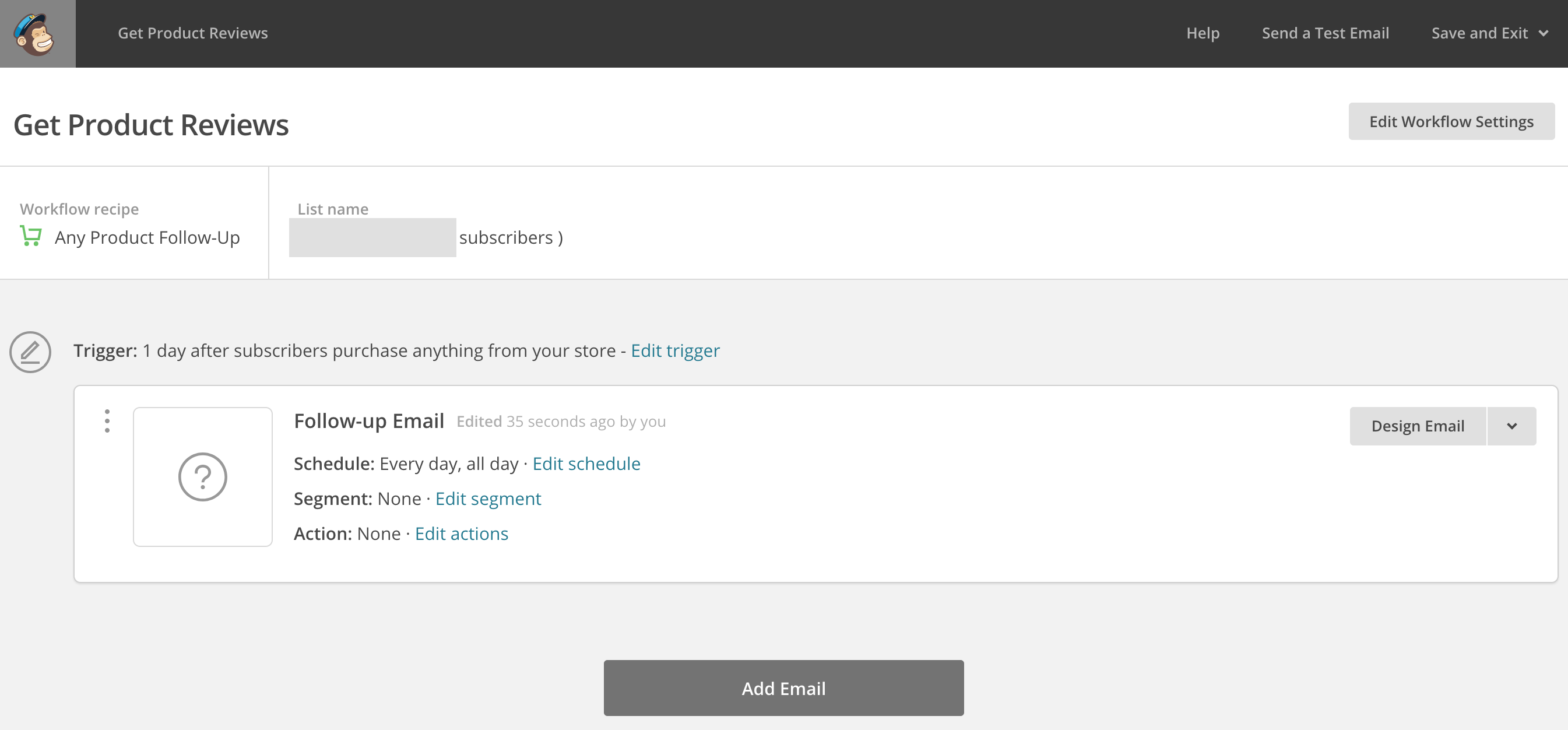
Here are some of the features:
- Email Automation: Automated email sequences for welcome emails, abandoned cart reminders, and more.
- Customer Segmentation: Segment your audience by behavior, purchase history, and more to send targeted and personalized emails.
- E-commerce Integration: Integrates with major e-commerce platforms like Shopify, WooCommerce, and Magento to sync customer data.
- Analytics and Reporting: See detailed email performance metrics including open rates, click-through rates, and conversion metrics.
- Personalization: Use dynamic content and personalized recommendations to engage and sell to your customers.
Shopify Plus
Shopify Plus is designed to cater to the needs of large businesses, offering extensive features and flexibility to support and automate various aspects of e-commerce.
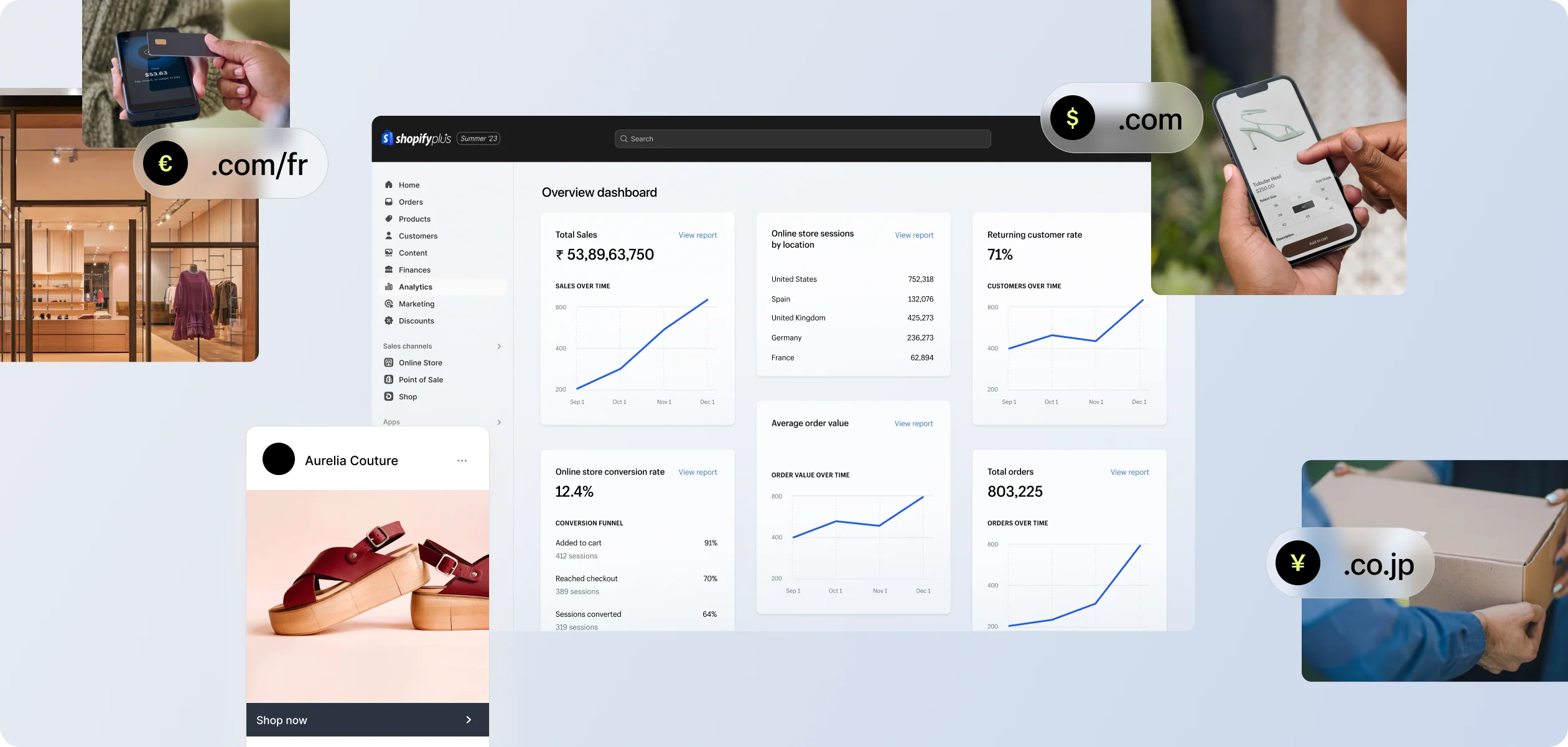
Here are some features:
- Shopify Flow: A workflow automation tool exclusive to Shopify Plus, that allows you to automate repetitive tasks and create custom workflows.
- Scripts: Shopify Plus Includes Shopify Scripts, which lets you customize the checkout experience and automate discounts, promotions, and shipping rules.
- Customizable Checkout: More control over the checkout process, allowing personalized experiences and tailored workflows.
- API: Integrate with other systems and automate processes across your e-commerce ecosystem.
- Third-Party Apps: Access to a wide range of third-party apps and integrations for marketing, analytics, and more.
Klaviyo
Primarily an email marketing platform, Klaviyo also offers robust automation features for creating targeted email campaigns and workflows based on customer behavior.

Features:
- Automated Flows: Create sophisticated email workflows that are triggered by customer behaviors.
- Dynamic Content: Personalize email content based on customer data, such as purchase history and browsing behavior.
- Product Recommendations: Use data-driven product recommendations in your emails to suggest relevant products to customers.
- Custom Templates: Design and customize email templates using drag-and-drop editor to create on-brand communications.
Hubspot
HubSpot is a CRM and marketing automation platform for businesses across sales, marketing, and customer service.

Features:
- Email Campaigns: Create and automate email campaigns, welcome emails, promotional offers, and drip campaigns.
- Centralized Contact Management: The CRM gives you a single view of customer interactions and data so you can manage relationships and track engagement.
- Segmentation: Segment your contacts by behavior, demographics, and purchase history to send targeted communication.
- Lead Scoring: Score leads based on behavior to make things easy for your sales team.
- Content Management: Manage and optimize your website content.
The rapid rise of ecommerce has forced many teams to reevaluate their marketing automation tools and tactics, and with good reason.
Let the eCommerce automation tools take care of those tedious, repetitive marketing tasks for you!
You could use marketing automation tools to identify a segment of customers who are most likely to buy a new product line based on their previous purchase history and demographic data.
Measuring Success with Marketing Automation
Measuring the success of marketing automation efforts is essential to optimize and improve campaigns. Key performance indicators (KPIs) to track include:
- Conversion Rates: Monitor the number of conversions generated from automated campaigns to assess their effectiveness.
- Open Rates: Track the percentage of emails opened by customers to gauge the initial engagement.
- Click-Through Rates: Measure the percentage of customers who click on links in automated emails to understand the level of interest.
- Customer Retention: Evaluate the impact of automation on customer retention and loyalty, ensuring that your efforts are fostering long-term relationships.
- ROI: Calculate the return on investment (ROI) of automated campaigns to ensure they are generating revenue and justifying the investment.
By tracking these KPIs, businesses can refine their marketing automation strategies, optimize campaigns, and drive more revenue and growth.
Conclusion
Marketing automation is of great value to companies. It improves the customer experience in a number of ways. As I said, chatbots eliminate the dependencies on humans and guarantee an instant response to users. Similarly, automation lets you customize your website/assets, send triggered emails and personalized messages, streamline sales and marketing, and much more. Then, based on the prospects/customers’ activities/responses, eCommerce marketing automation tools prompt the sales reps to follow up with them. All these contribute to a better customer experience, and consequently, increase the revenues.
Marketing automation software is your knight in shining armor. So, pick the right one! And if you’re wondering which one to pick, look no further than LeadSquared!









